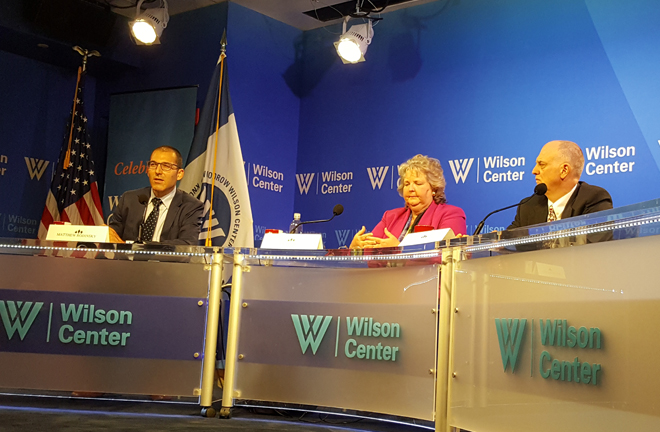China, Russia contribute to building new world order

A discussion of the book China, Russia, and Twenty-First Century Global Geopolitics was held on June 6 at the Woodrow Wilson International Center for Scholars.(WANG YOURAN/CSST)
On June 6, the Woodrow Wilson International Center for Scholars held a discussion of the book China, Russia, and Twenty-First Century Global Geopolitics by Sharyl Cross and Paul Bolt.
The authors talked about the China-Russia relationship and its impact on the world order with Matthew Rojansky, director of the Kennan Institute at the Wilson Center. Cross is a distinguished professor and director of the Kozmetsy Center at St. Edward’s University as well as a global policy fellow at the Kennan Institute. Bolt is a professor of political science at the US Air Force Academy and guest speaker at the institute.
Cross and Bolt argued that China and Russia, as two leading powers, will be critical for managing the most pressing challenges facing humanity and have a major influence on the course of 21st century geopolitics.
The China-Russia relationship has become increasingly close and dynamic in the past two decades, but this is not to suggest that the two countries have overcome all differences in their perspectives and politics. China is relatively cautious in its foreign policy in order to preserve a stable environment for economic growth, while Russia is more willing to violate traditional norms and expectations and defy US preferences if it believes it is in its interests to do so, according to Cross and Bolt.
Bolt said that the China-Russia political relationship is close while the main challenges reside in the economic sphere. As the relationship is determined largely in a top-down manner, linkages are generally state-oriented, and economic exchanges mostly occur between state-owned firms or companies associated with the government. There are huge structural differences in the Chinese and Russian economies that will continue to impede closer bilateral economic cooperation even with strong political will to overcome them.
Cross and Bolt analyzed the China-Russia relationship on the basis of four major themes. The first is that there is a substantial coincidence of interests between China and Russia that enhances their relationship, and the most important one is the primacy each country places on security as well as the belief that external and internal threats are closely linked.
The second theme is that China and Russia, separately —but even more so as strategic partners—will be key forces in reshaping the world order. Western triumphalism after the end of the Cold War is past, and China and Russia will be influential in all major global issues, affecting the balance of power, norms of domestic and international conduct, international institutions and world economy. China and Russia are a potential counterbalance to the United States and other Western countries, but their cooperation with the West will also be critical in managing various transnational security challenges.
The third theme is that Western countries, particularly the United States, are still important for China and Russia, but they demand the West make greater accommodation of their interests.
The fourth theme is that China and Russia are “comprehensive strategic partners” but not “allies.” While cooperation between the two countries is making rapid progress, there are limits to the amount of support one can give the other due to history and power differential between them, and a formal alliance would violate China’s commitment to its multilateral vision of a new type of major country relations.
WANG YOURAN is a correspondent with Chinese Social Sciences Today.
